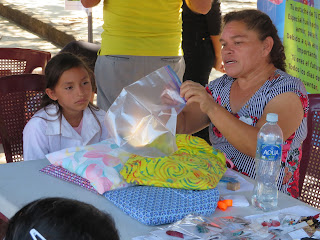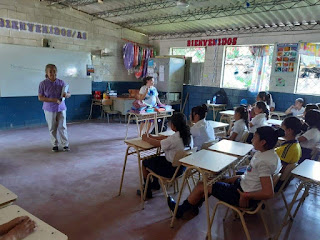Women's Collective for the Win!
This is an update on a story that began in 2016 - a story about commitment, perseverance, teamwork, inspiration and adaptation.
Background
Within the Days for Girls International framework, a model is provided for setting up small, local enterprises within impoverished communities as a means of both employing women and supplying communities with locally-made Days for Girls kits. A small group of women (part of an organized community group) began working together to learn and then to produce Days for Girls kits. The group formed as "Iglesia Luterana Los Héroes en la Fe Mujeres Emprendadoras de Tonacatepeque" (yes, quite a mouthful!) or Heroes in the Faith Lutheran Church Entrepreneur Women of Tonacatepeque, and is formally connected with a Days for Girls chapter in western Wisconsin. During 2017, the women were trained by the Wisconsin team. Once they had perfected their skills, in compliance with the gold standard set by Days for Girls, the women began to market their kits locally. The women produced a brochure appropriate for their local culture. The women agreed that each woman would receive $5 for each full day of work.
 |
| Fiorela was the first Salvadoran expert in making shields. |
Challenges: Materials and Cost
Since the beginning, the women have relied on using a combination of donated and locally purchased materials. The breathable plastic fabric (used for the interior of the shield which protects blood from leaking onto the underwear) is not available in El Salvador, nor are the plastic snaps. Quality flannel can be purchased for approximately $4 per yard. It comes in patterns with pale colors most suitable for babies (not exactly in sync with Days for Girls guidelines), but the Salvadoran women say they like the pale, cheerful patterns. 100% cotton fabric can also be difficult to find. The cost of producing a kit with locally purchased and some donated materials is $11. The price for which the women can sell the kit locally is $7, and just to pay the women for their work, they would need to sell 5 kits per day. There are currently 7 women sewing in the Collective.
 |
| The Collective stores finished products and kit components in donated suitcases. They are working to purchase plastic tubs as a more efficient storage system. |
Education
Alongside the "Colectivo" or "Women's Collective" (as it is now known - better than the mouthful), the Salvadoran Lutheran Church, local health clinics and local women's organizations work diligently to provide reproductive and sex education to girls and boys in schools, and to women and men in community workshops. In addition, the annual Mission of Healing Family Wellness Fairs (jointly run by Lutheran Churches from Wisconsin and the Salvadoran Lutheran Church) provide holistic wellness education with particular focus on women's and men's health. Days for Girls kits are distributed for free at the Menstruation Charla (for girls ages 8-25) at the Family Wellness Fairs. The Mission of Healing kits are made by Wisconsin Lutheran Church groups and carried to El Salvador. When available, donated kits are provided to trained reproduction/sex educators of the Salvadoran Lutheran Church for distribution in schools where they work, particularly in isolated, rural areas of the country. The Salvadoran Lutheran Church has received donations of Days for Girls kits from a few different sources in the United States and also from Ontario, Canada.
 |
| Classes like this one throughout El Salvador could benefit from education and the distribution of kits. |
Adaptive Marketing Strategy
The women in the Collective make decisions by consensus, but also rely on a small "board" of leaders: Sonia (Evangelist at Heroes in the Faith, trained reproductive health educator and sales coordinator/account manager), Deb (the western Wisconsin Chapter leader), Pastor Santiago, Pastor Francisco, my husband (dudes in the room who do provide a rare word of inspiration) and me. During a cost/market analysis meeting in late 2018, we identified the market for kit sales as being perpetually small. The need for education and free kits in small hamlets and the countryside is consistently great. We decided to raise awareness through the Lutheran Sister Church network of the opportunity to gather and donate funds for the purchase of kits from the Collective. These kits would then be given to the reproductive health educators to give away during their 12-unit education courses in schools and churches. The Collective would still sell kits locally when and where they could.
 |
| Kits for sale at a local exposition of women entrepreneurs. |
Inspiration
As we thought about churches raising funds to purchase kits, a friend of a friend contacted me by email. She is a faithful woman, motivational speaker and educator who works with women's groups in the US. Through a little divine intervention networking, this new friend (whom we call Angel) began to collect offerings from her event participants. We have shared inspired conversation about working to provide women with the menstruation resources they need locally and globally. The initial gifts which Angel sent to El Salvador were sufficient to provide the women of the Collective with pay and provide kits for the educators to distribute during the first half of 2019. Additional gifts have arrived and so have some Days for Girls donated kits!
Win-Win-Win in 2020
The Collective is currently providing 7 women with 3 days of work per week at $5 per day. This is not a living wage, but for women who have no other chance to work (some are elders, some are mothers of young children), this is enough to buy corn, beans or medicine. The women are extremely hopeful about the future, aspiring to work more days, and to welcome a few new women into the sewing circle (who will spend a year learning, as they did, without financial compensation). Here is a bit of insight into the Collective's Win-Win-Win Strategy for 2020:
- In gratitude for and inspired by Angel's Project, the Collective will continue to promote the donation of funds to be used to purchase kits from the Collective. The current budget calls for hoped-for donations to purchase 40 kits per month. (Ideally, income from the sale of 60 kits per month would provide each woman with 12 work days per month.) Donations can be sent to the Greater Milwaukee Synod of the ELCA for transfer to the Salvadoran Lutheran Church. Pastor Conchi, health ministries coordinator for the church, will receive the monthly quota of kits and will distribute them to the educators. The target distribution zone for early 2020 is the far western part of El Salvador, which has few resources and has never had access to kits.
- The Collective will focus on local sales to raise funds for the purchase of raw materials and to complement the stipends for the women. The local church has been working to raise money so Sonia can be compensated too. Sonia, who is a volunteer in ministry, has been reluctant to take any stipend, but the Collective agrees she should receive $5 for each day she works too.
- After studying the local market and learning about a new product, the Collective decided to diversify its product production. Deb taught the women how to make breast shields for nursing moms. The women are also making baby blankets. They are coordinating with other local women who make baby clothes and crocheted booties and hats. This new line of Baby Shower Gifts is already helping to fill the gap when sales of the Days for Girls kits are slow. (Baby Showers are HUGE in El Salvador.)
- The Collective is part of a consortium of small businesses run by women. Together, these women have recently opened a store in which to sell their products. (Days for Girls kits produced by the Collective are also available in two other store locations.) Through this network of small businesses, the Collective will be purchasing intimate soap for inclusion in their Days for Girls kits. (In fact, the kits which the Wisconsin churches are bringing will also feature this product as a way of supporting a local business.)
 |
| This home-based soap business will be the new source for intimate soap (made with chamomile and tested by the women in the Collective) for Days for Girls kits. |
 |
| Some of the Collective members show off their latest product. |
 |
| Some of the women at the business expo |
How YOU can Provide Support
To support the Los Héroes Women's Collective, or Days for Girls in general, step 1 is to learn all you can! Check out the links below. Connect with me either in the comment section or via email. Your enthusiasm and support for women's education and women's health do make a difference, not only in El Salvador, but in your own community. Visit Days for Girls web site, to learn more about their global efforts. Whether you sew kits in the US, donate raw materials for making the kits, or donate funds to purchase kits made locally in El Salvador, you are providing an important piece to the overall Win-Win-Win strategy. Thank you to the many, many women who support this effort, for your prayers, your skill and your donations.
To learn more about reproductive education, women's health and Days for Girls in El Salvador, please consider reviewing these previous stories (organized from most recent to oldest):
Sex Education in El Salvador - highlighting what students today are NOT receiving in the way of education and why the work of the Lutheran Church is so important
Girls and Sex Education
Days for Girls in El Salvador - Women Working for Good (includes a timeline with information about how this particular project began)
Tremendous
Days for Girls in El Salvador
Kits for Girls
A Wellness Issue and How You Can Help - including a sassy introduction you don't want to miss
How Can This Be? - the truth of this story is heart-breaking and highlights an horrific reality in El Salvador. Social workers, human rights workers, medical professionals, educators and law enforcement know of these horrors, but the path forward to prevention and justice is not a straight one. Walking beside each in these challenging moments informs the work we do together and cements our commitment to give women and girls the educational tools they need to protect themselves and care for themselves in the best ways they can.





Comments
Post a Comment